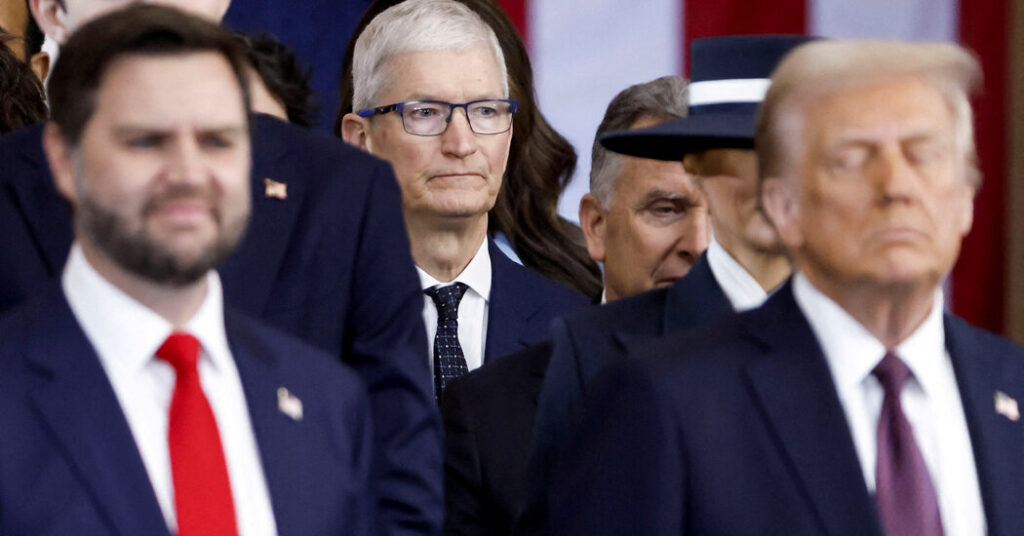Days after Apple’s chief executive met with President Trump, the company said on Monday that it planned to spend $500 billion and hire 20,000 people in the United States over the next four years and open a factory in Texas to make the machines that power the company’s push into artificial intelligence.
“We are bullish on the future of American innovation, and we’re proud to build on our longstanding U.S. investments,” Tim Cook, Apple’s chief executive, said in a statement. The company made similar, smaller pledges during the Biden administration and President Trump’s first term. It hasn’t fulfilled all its previous promises.
Mr. Cook met with Mr. Trump last week. After that meeting, Mr. Trump said that the company would shift production to the United States: “They’re going to build here instead because they don’t want to pay the tariffs,” Mr. Trump said in a speech to a gathering of governors.
Most iPhones are manufactured in China by the Taiwanese electronics giant Foxconn, which will be involved in Apple’s new Houston facility. Earlier this month, U.S. tariffs of 10 percent on all Chinese products took effect. Levies on imports from Canada, Mexico and other major trading partners could be imposed in the coming weeks.
Foxconn has spent millions of dollars over the past two years building up its operations outside of China, including in Texas, and in Mexico, where the company already assembles A.I. servers. The company’s chairman previously said that this expanded footprint would help insulate Foxconn against U.S. tariffs.
Last year, Foxconn purchased a tract of land north of Houston, next to one of its warehouses, which it said would be used for its artificial intelligence business.
Apple said it would begin assembling advanced servers “previously manufactured outside the U.S.” at a new, 250,000-square-foot facility in Houston. The facility is slated to open next year, Apple said, and “will create thousands of jobs.” As the company rolls out A.I. features in its devices, it also plans to expand its data center operations in Arizona, Iowa, Nevada, North Carolina and Oregon.
The majority of Apple’s devices have historically been made in China. In recent years the company has ramped up its efforts to make more iPhones in India, but it still must ship many of the essential parts from China and elsewhere. Similarly, the servers Apple has said it plans to assemble in Texas would likely contain advanced computer chips and other components made outside the United States.
The world’s most advanced A.I. servers depend on an intricate network of companies that have spent decades developing specialized tools and processes. They contain chips made by Taiwan Semiconductor Manufacturing Company, which produces the majority of cutting-edge computer chips in Taiwan and depends on machines made by the Dutch company ASML.
TSMC has also been expanding its manufacturing footprint in the United States. In 2020 the company said it would build a factory in Arizona; it quickly announced a second and then a third amid a push from the Biden administration to boost U.S. chip manufacturing. But it also pushed back the start of production in Arizona, saying local workers lacked expertise in installing some sophisticated equipment.
Shortly before he left office, President Joseph R. Biden Jr. completed an agreement to award $6.6 billion in grants to TSMC. The government said it planned to give TSMC the money in tranches as the company meets milestones. Apple is the facility’s largest customer.
TSMC has already start making chips for Apple in Arizona.
Apple described its announcement on Monday as its “largest-ever spend commitment.” The $500 billion would go toward manufacturing facilities, data centers and entertainment productions, the company said. Apple employs more than 150,000 people around the world.
Monday’s statement had echoes of prior Apple announcements.
Four years ago, a few months after Mr. Biden’s inauguration, Apple announced an “acceleration” of its U.S. investments, pledging to spend $430 billion and add 20,000 jobs over five years. In January 2018, during Mr. Trump’s first term, the company said that its “direct contribution to the U.S. economy” would be $350 billion over five years and that it planned to create 20,000 jobs over that period.
Mr. Trump thanked Apple and Mr. Cook in a social media post on Monday. Mr. Trump said the move showed that the company had “faith in what we are doing.”
Read the full article here


